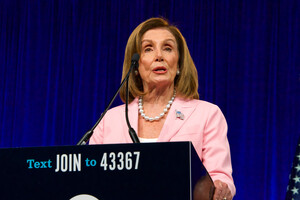A quarter of a century ago, Beijing was not happy about the trips of American politicians to Taipei, but then in the US, both parties sought better relations with China.

Nancy Pelosi is not the first Speaker of the House representatives of the US Congress in Taiwan. But due to changes in the political context, Beijing views her visit differently from Newt Gingrich's trip in 1997.
On Tuesday, Gingrich said on Fox News that during his trip to the island, he made arrangements with Beijing, which also allowed him to visit China. From mainland China, the then speaker of the lower house of Congress went to Japan and only from there to Taiwan. This allowed him not to make a direct trip from the mainland to the island, – writes the Hong Kong newspaper South China Morning Post.
The speaker of the House of Representatives is the third in line of those who can potentially replace the president. Pelosi became the most influential US politician to visit Taiwan since Gingrich. On Tuesday, China's ambassador to the U.S., Qin Gang, told CNN that the 1997 visit was “absolutely wrong.”
“The Chinese side was against it from the beginning. The United States should have learned from this, and not repeat old mistakes. One mistake cannot justify further similar mistakes,” the Chinese ambassador said.
But in 1997, Beijing's reaction was calmer than it is now. The People's Liberation Army has announced a series of live ammunition drills off the coast of Taiwan. Beijing has also introduced new restrictions on trade in the strait. Su Hao, a professor of international relations at the Foreign Affairs University of China, said Beijing views the intentions of the two House Speakers' visits differently. In 1997, the search for improved relations between the US and China was on the agenda of both Republicans and Democrats.
Also read: WP: Pelosi's visit to Taiwan created extra problems for Biden
« At the same time, bilateral relations were improving. There was a positive trend of cooperation between the countries,” Su Hao said, recalling that in 1997 Gingrich met with Chinese leader Jiang Zemin and Premier Li Peng, as well as former Shanghai mayor Wang Daohang, who played a major role in relations between Beijing and China. Taipei.
“But now Pelosi ignored the warning from China, and the visit was very provocative,” said the Chinese expert.
Gingrich also visited Taiwan a month after Vice President Al Gore's visit to China, and shortly after Hong Kong was handed over to China. These were the times when Beijing did not want to spoil the atmosphere with disputes with the United States. The parties also sought to improve relations, which were strained after Taiwanese President Li Denghui visited the United States in 1995. Then the People's Liberation Army launched missiles in the Taiwan Strait. Gingrich led the campaign to lift sanctions on Beijing, which were imposed for the bloody suppression of pro-democracy protests in Tiananmen Square in 1989. He also expressed support for the Chinese government's position that Taiwan and China are one country. President Li Denghui's office issued a statement after Gingrich's visit that “there is no need to declare independence” because “the Republic of China is already an independent sovereign country.”
Read also: Economic issue: why Taiwan is interesting to China, and why the US will not agree with it
But now the tension between the US and China is very high. And Pelosi's program in Taiwan touched many of Beijing's pain points. Unlike Gingrich, who was on the island for only three hours, she spent the night in Taipei and met with President Tsai Ing-wen, as well as politicians, dissidents and human rights activists, including Lam Wing-Ki, who fled Hong Kong in 2019. and one with the former leader of the Tiananmen Square students, Wuer Kaixi. The US president tried to convince Beijing that Congress is a separate branch of government that is not connected to the White House. But despite this, Xi Jinping warned Joe Biden during a telephone conversation that Washington should not “play with fire” on the issue of Taiwan.
Related video
“The nature of bilateral relations between China and the United States has changed. And Taiwan was used as an outpost, as a pawn in Washington's efforts to contain China,” said Peking University professor Wang Yong.




